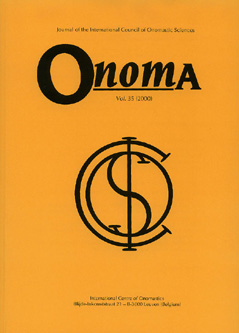 previous article in this issue previous article in this issue |

Preview first page |
Document Details : Title: Cognitive Approaches to Hungarian Toponymy Author(s): RESZEGI, Katalin Journal: Onoma Volume: 47 Date: 2012 Pages: 367-379 DOI: 10.2143/ONO.47.0.3085153 Abstract : Hungarian onomastic research has always been open to other areas of linguistics, as well as to ways of thinking and results of related study fields. The psychological viewpoint already appeared in studies in the 1940s. However, as a general theoretical framework, the cognitive approach appeared in Hungarian onomastics only as late as the early 21st century. Nevertheless, over this short period of time it has been applied successfully in numerous fields of onomastic research. In my paper I review how the cognitive approach is used in Hungarian onomastic research and consider the results of applying the cognitive view: with connection the problem of grammatical categorisation of word-classes and meaning; the typology of toponyms; the metonymical name-giving and metonymical name usage; the relation between the mental map and toponyms; the functionalist typology of toponyms. La recherche onomastique hongroise a toujours été ouverte aux autres domaines de la linguistique, de même qu’aux méthodologies et résultats des champs d’études connexes. Le point de vue psychologique est déjà apparu dans nos études dans les années 1940. Toutefois, en tant que cadre théorique général, l’approche cognitive n’est pas apparue dans l’onomastique hongroise avant le début des années 2000. Nonobstant, pendant ce court laps de temps, elle a été appliquée avec succès dans de nombreux champs de la recherche onomastique. Dans cet article, j’étudie comment l’approche cognitive est employée dans la recherche onomastique hongroise et ses résultats: en relation avec la question de la catégorisation grammaticale des classes de mots et du sémantisme; la typologie des toponymes; la nomination métonymique et l’emploi des noms métonymiques; la relation entre carte mentale et toponymes; la typologie fonctionnaliste des toponymes. Die ungarische Namenforschung ist stets offen für andere Bereiche der Sprachwissenschaft gewesen, wie auch für die Denkweisen und Ergebnisse benachbarter Disziplinen. Der psychologische Standpunkt war bereits in Studien der 1940er Jahre aufgetaucht; doch als allgemeines theoretisches Gerüst erschien der kognitive Ansatz als erst zu Beginn des 21. Jahrhunderts. Trotzdem ist er seither in dieser kurzen Zeit auf zahlreichen Gebieten der Onomastik erfolgreich angewandt worden. In meinem Beitrag gebe ich einen Überblick über die Arten der Verwendung dieses kognitiven Ansatzes in der ungarischen Namenforschung und untersuche die Ergebnisse der kognitiven Sichtweise: in Zusammenhang mit der Frage der Kategorisierung von Wortklassen und ihrer Semantik sowie der Typologie der Ortsnamen; in Bezug auf die metonymische Namengebung und den metonymischen Namengebrauch; auf das Verhältnis zwischen kognitiver Landkarte und Ortsnamen; sowie schließlich auf die funktionalistische Typologie der Toponyme. |
|


